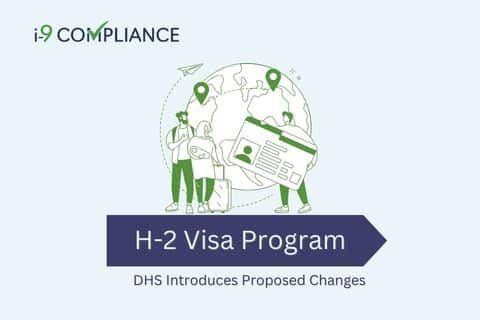DHS Introduces Proposed Changes to the H-2 Visa Program

October 12, 2023
The U.S. Department of Homeland Security (DHS) intends to revise the H-2 visa program. The department has issued a notice of proposed rulemaking announcing this decision. The proposed regulations would make it easier for temporary workers to remain in the U.S. between periods of employment.
It would also create whistleblower protections and allow employers to potentially recruit workers from countries not listed on the H-2-eligible list. According to the DHS, this proposed rule aims to “strengthen worker protections and the integrity of the H-2 programs, provide greater flexibility for H-2A and H-2B workers, and improve program efficiency.”
The proposal would increase worker protections by further barring employers from charging fees. It also clarified the employers’ responsibility for reasonable return transportation costs in the event of petition revocation. Furthermore, H-2 workers would receive similar whistleblower protections as H-1B workers.
However, these proposed regulations could negatively impact some employers. For example, employers may become ineligible for hiring H-2 workers due to labor law or program violations. Employers should refer to a legal expert to ensure eligibility if the DHS implements these changes.
The DHS also aims to increase flexibility in the H-2 programs. One way is by making H-2 portability permanent. Implementing this change would allow employers to hire H-2 workers with pending H-2 petitions, though they must be in the United States under lawful conditions.
Furthermore, the proposed changes would provide extended grace periods for workers entering and departing from the United States. They would also permit H-2 workers to enter up to ten days before their petition’s validity period begins. Eligible workers can remain up to 30 days following its expiration. H-2 workers interested in ending their employment with a petitioner may also benefit from a new 60-day grace period. During this time, they could seek new employment.
In an announcement regarding the proposed changes, Secretary of Homeland Security Alejandro Mayorkas stated, “For years, H-2A and H-2B temporary worker visa recipients have been essential to our seasonal and agricultural economies. These proposed reforms will help U.S. employers address worker shortages through new program flexibilities. They will also help provide this vulnerable population of workers with the protections they deserve.” Employers may submit comments on the proposed rule within the 60 days ending November 20, 2023.
Regardless of whether employers hire seasonal workers, they must comply with the employment eligibility verification (Form I-9) regulations. Unfortunately, this process has proven challenging, especially when hiring temporary workers. An electronic I-9 management tool can simplify this process by providing step-by-step guidance and reminders to help employers comply with federal requirements.
Streamline your hiring process with an automated employment eligibility verification and ensure compliance today with I-9Compliance.